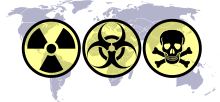This page is just to accumulate stuff which might end up in Funding of science articles, or possibly Research programmes through the ages... Please contribute if you feel moved! Ta, Jacky
Comments
Ok, I can see this lot shifting towards a survey of Who did What, Where, before we can comment on Why and – how it was funded. Will keep adding, even if not directly useful to Funding articles. JackyR 21:14, 21 February 2006 (UTC)
Ancient
- Egyptian/Middle Eastern surveying and accounting needs.
- Calendar calculation for religious or farming reasons
- Greek and Middle Eastern engineering achievements
~600 to ~1000
- Middle Eastern science (but why?) Gresham lecture by Robin Wilson
Medieval (from ~1000)
- Peter Abelard's Sic et Non. Reintroduction of dialectic as means of philosophical research, possibly to aid religious dispute against Cathars. (France)
- European eagerness for Arabic texts for mathematics and accounting. Continuing primacy of accounting, surveying and navigation as motivations for science from 1100s onwards. Eg, check first printed books - mathematical texts some vast proportion of these.
- Roger Bacon and co. Monasteries supporting research programs for religious reasons, eg Franciscan obsession with light/colour. (UK)
- Cathedral building programmes and engineering/mathematics. Also masons' knowledge, trade secrets, etc.
- Prince Henry the Navigator's C15th School of Navigation at Sagres (Spain)
- Universities: Italy, France (Paris), England (Oxbridge), W Africa ( Timbuktu)
Modern science (from ~1600)
- Independent wealth (crucial until late 19th century)
- Patronage and the court (crucial until ?beginning of 19th century?)
- Royal/noble patronage
- Religious patronage
- Gresham College (self-funded gentleman-scholars, and the people they funded)(UK)
- Royal Institution (UK)
- Royal Society (UK, Europe)
- Royal Geographical Society (1830), Royal Scottish Geographical Society (1884) (UK)
- Longitude Prize Funding arose after naval disaster. (UK)
- 18th century and 19th century (Dissenter?) research - knowing god's world as a means of knowing god. (->early quantitive data on meteorology, annual behaviour patterns of flora and fauna, description of species, collections) (UK, )
- large numbers of gentlefolk/clerical scholars pursuing the above at a low level, as a "suitable activity" for a gentleman or lady -> massive accumulation of data/specimens (UK)
-
Industrial Revolution Private funding for potentially profitable discoveries (UK, )
- German organic chemistry and the dye industry (UK, Germany, colonial India)
- Telegraphy - some funding from private companies for profit. Check whether also institutional funding. (UK, )
- "Railway time" : casue of standardisation of time. Railway laid telegraph lines to Manchester to bring time from Greenwich Observatory. Also conductor's watch, bringing London time every morning. (UK)
- Public health - democracy of some diseases ( cholera and typhoid?) and move to funding general hygiene measures. 1830s(?) London: Check out inscription re Berwick St pump.
-
Louis Pasteur (France)
- prizes, profit from vaccines and pasteurization
- Great Exhibition funded museums - also research? (UK)
- Check out motivations/funding for grand 19th century institutions in France, UK, ...
- rise of the university
- professorships
- private tutoring
- Scientists along on exploratory/commercial/military voyages
- search for new food stuffs: potatoes, tobacco -> Europe, maize -> Africa (check dates, some early)
- Joseph Banks (1766).
- Darwin on the Beagle.
- Political economy and resource management
- Lavoisier managing mineral resources, Mendeleev similarly
From ~1900
- Rise of scientific meteorology during WWII; massive recruitment and training in subject previously limited to the academy. After the war, war meteorologists soon replaced apprentice-based meteorology across US.
World War II
- Governments become major investors in science for purposes of war technology
- Code-breaking
- Nuclear, biological, chemical warfare
- Radar (super important)
Cold War
- Big Science in full swing
- Nuclear arms race
- Space Race Political pride with spin-off (velcro, WD40)
- Sputnik's effect
- National Science Foundation, CERN
- Continental drift evidence from maps of ocean topography for submarines
- RAND
- Rise of technical reports instead of traditional journal publications, for large-scale classified research
Post-Cold War
- Japanese government identifies areas of likely technological demand/profitability and offers tax breaks to private companies for working in these areas. (Eg in 1990s it was encouraging research into improving digital storage media in this way).
- Medical research - how does funding in each country reflect commercial interests and historical ethos in that country. Eg, Germany spends money on researching herbal medicine, China recently invented mechanical device to improve cardiac blood supply, UK tends to "a pill for everything" (and has lots of pharmaceutical companies). Check out funding for malaria research versus funding for weight-loss or cardiac probs.
- Currently, in the UK, science research is usually funded by one or other of the following: RCUK (Research councils UK i.e. BBSRC, EPSRC, NERC, MRC), directly from government departments i.e DTI, DEFRA and MOD, from university coffers, industry (either inhouse or externally), or charities (inhouse i.e Cancer Research UK or externally). (Not sure if this is useful information as it is more current information, but if you take the various research councils, you can make small histories for each of them, plus for Cancer Research UK, so they do go back a bit. Maybe a current funding of science page would be more suitable for this info, if there is one). Terri G 17:33, 3 July 2006 (UTC)
Multiple periods/Unsure of period
- Hindu mathematics
- Chinese earthquake detectors
- Chinese astronomy (purposes?)
- Iron-working throughout world (spec. Africa): look into purposes - mainly military or mainly domestic
- Artillery calculations
- Refs for technology in the Philippines
Literature and WP articles
- Edited volume: Science Bought and Sold. 2002.
- Savage. Funding Science in America. 1999.
- Martino. Science Funding. 1992.
- NSF Science and Engineering Indicators. 2006 and earlier. [1]
- Military funding of science
